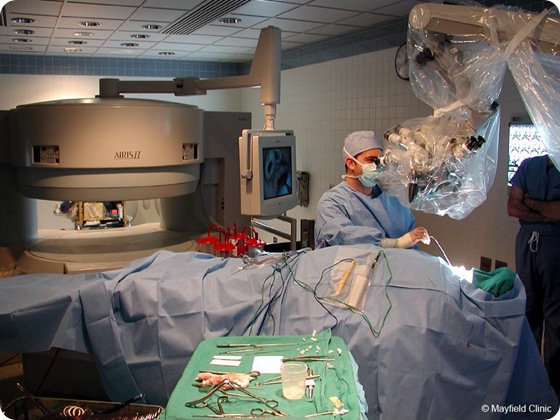Jun 3 2009
After a review of 284 cases, specialists at the Brain Tumor Center at the University of Cincinnati (UC) Neuroscience Institute have concluded that performing a stereotactic needle biopsy in an area of the brain associated with language or other important functions carries no greater risk than a similar biopsy in a less critical area of the brain.
The retrospective study, led by Christopher McPherson, MD, director of the division of surgical neuro-oncology at UC and a Mayfield Clinic neurosurgeon, was published online in May in the Journal of Neurosurgery. The abstract can be accessed at http://thejns.org/doi/abs/10.3171/2009.3.JNS081695.
The UC study compared the complication rates of stereotactic biopsies in functional, or "eloquent," areas of the brain that were associated with language, vision, and mobility to areas that were not associated with critical functions. Eloquent areas included the brainstem, basal ganglia, corpus callosum, motor cortex, thalamus, and visual cortex. Complications were defined as the worsening of existing neurological deficits, seizures, brain hemorrhaging and death.
"Needle biopsies in eloquent areas have generally been acknowledged to be safe, because the needle causes only a small amount of disruption to the brain," McPherson explains. "But until now, researchers had not actually documented that biopsies in eloquent areas were as safe as those in non-eloquent areas." 
To make that comparison, McPherson's team studied records of 284 stereotactic needle biopsies performed by 19 Mayfield Clinic neurosurgeons between January 2000 and December 2006. In the 160 biopsies that involved eloquent areas of the brain, complications occurred in nine cases (5.6 percent of the total). In the 124 biopsies that involved non-eloquent areas, complications occurred in 10 cases (8.1 percent). The difference was not statistically significant.
Overall, 19 of the 284 patients, or 6.7 percent, suffered complications. Thirteen of those patients recovered completely or somewhat from their complications, while six (2.1 percent of the total number of patients biopsied) experienced permanent neurological decline.
"Diagnosing and treating brain tumors always carries risk," McPherson says. "Within that context, the results of this large sampling of biopsies are encouraging overall and reinforce our belief that stereotactic biopsy is a valuable diagnostic tool. Stereotactic biopsy is a safe way for us to remove a tissue sample for the diagnosis of a brain tumor, even when the tumor is in a challenging and dangerous part of the brain."
Additional co-authors of the study are Ronald Warnick, MD, director of the UC Brain Tumor Center and chairman of the Mayfield Clinic; James Leach, MD, associate professor of neuroradiology at UC and neuroradiologist at Cincinnati Children's Hospital Medical Center and the UC Neuroscience Institute; and Ellen Air, MD, PhD, a resident in the UC Department of Neurosurgery.
The Brain Tumor Center, under Warnick's direction, treats hundreds of patients from the Greater Cincinnati region and beyond each year. The multidisciplinary center, which includes specialists in neurosurgery, radiology, radiation oncology, otolaryngology, internal medicine and physical medicine and rehabilitation, is committed to evidence-based medicine, compassionate care, research and the utilization of emerging therapies and technologies.
http://www.uc.edu/